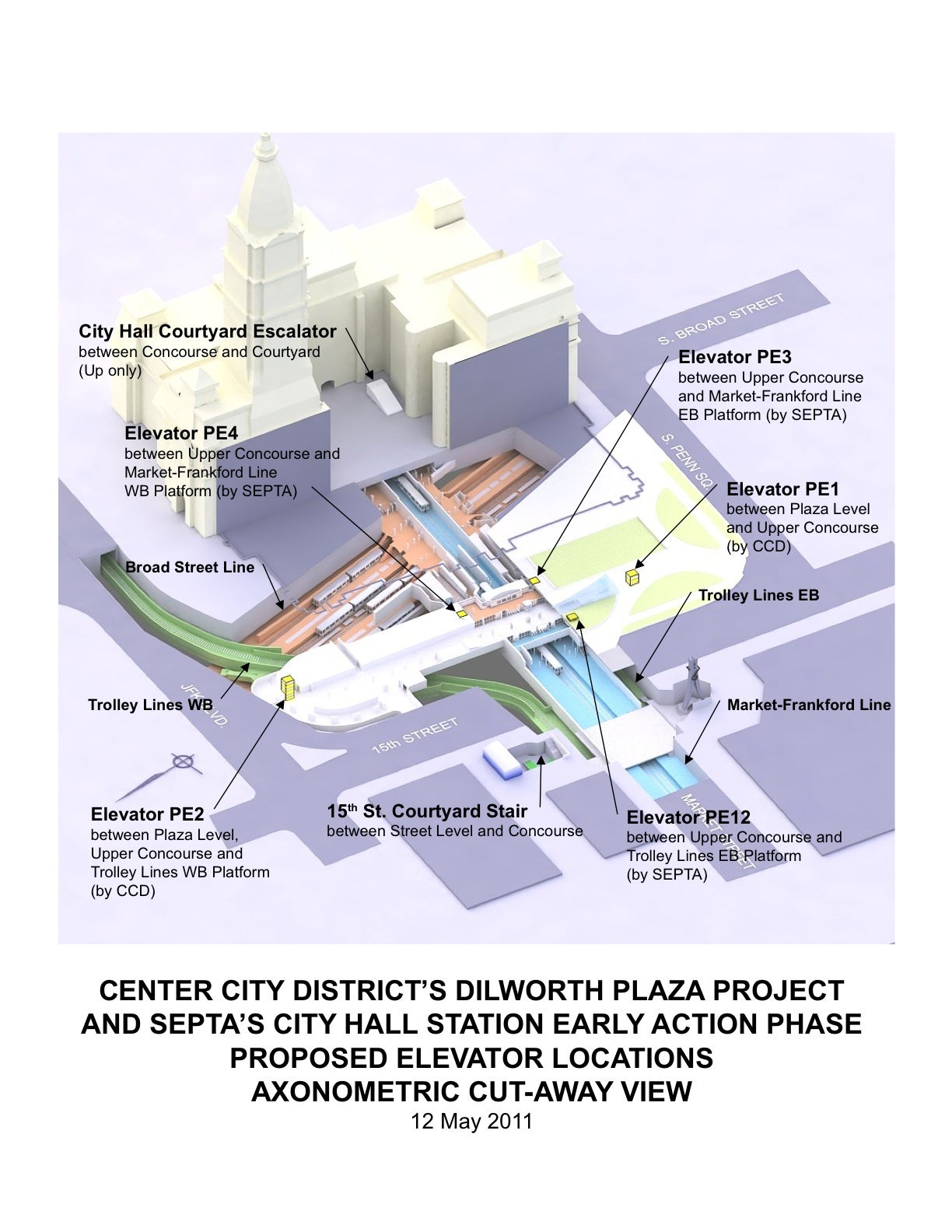SEPTA riders getting City Hall elevators down to the El

SEPTA riders will be getting elevators at the 15th Street Market-Frankford El station thanks to a consent decree that ends a contentious lawsuit filed against SEPTA eight years ago.
The two elevators, which will lead from the Dilworth Plaza concourse to the east and west El platforms, will be installed as part of Center City’s redesign of the City Hall courtyard.
SEPTA and the Center City District will also install two elevators from the courtyard to the concourse as part of the project, as well as elevators down to the 15th Street trolley platforms. By the time Dilworth is remade, only the Broad Street Line portion of the station will lack elevators.
The elevators are scheduled for completion by the end of 2013, according to the consent decree, which was approved by U.S. District Judge Gene E.K. Pratter last week.
The decree brings to a close a lawsuit filed in 2003 by the Disabled in Action of Pennsylvania against SEPTA. The group argued that SEPTA’s renovations of an escalator and staircase leading down to the concourse meant that the authority had to put in two elevators ― one on the northwest corner of 15th and Market streets and the other on the southeast corner of the City Hall courtyard ― under the Americans with Disabilities Act.
Pratter ruled in favor of Disabled in Action in 2009, and the Third Circuit Court of Appeals affirmed that decision in a February ruling.
The two new elevators down to the El were “basically a quid pro quo,” according to attorney Stephen F. Gold, who represents Disabled in Action.
Neither SEPTA nor the Center City District wanted to put in elevators at the designated locations because it would interfere with plans to reconstruct Dilworth Plaza, so the group traded SEPTA for “actual access” down to the El, Gold said.
The suit only sought access to the concourse level, not the platforms.
Gold added that it’s “not unusual” for lawsuits like this to end in a compromise that provides equal or better access for the disabled than what was originally sought.
SEPTA spokeswoman Jerri Williams said the elevators were already part of SEPTA’s $100 million plan to reconstruct City Hall station, which is the system’s busiest. That project has been pushed back because of cuts in state funding, and only a small portion will be completed along with the Dilworth Plaza project.
Williams estimated that SEPTA will pay between $7 million and $10 million to install elevators from the street down to the concourse ― which were part of the original Dilworth Plaza plans ― and from the concourse to the El.
SEPTA has agreed to reimburse Center City District up to $5 million for the cost of the first set of elevators, which CCD is installing at the northern and southern ends of the plaza. The northern elevator will also provide access to the westbound trolley platform.
Paul Levy, the district’s president and CEO, said that “the agreement’s a very, very good one” because “it makes Dilworth Plaza even more of a transit center.”
The Center City project will cost $50 million and has received federal stimulus funding. It will replace the current concrete plaza with a grassy area, improved amenities and a cafe.
In addition to the elevators, Disabled in Action agreed to refrain from suing SEPTA for not making the Broad Street Line accessible when it installs a new smart card system.
Gold said that such a lawsuit is “a SEPTA boogieman,” explaining that the new fare system might affect “the path of travel” in the stations ― which would trigger federal requirements to provide accessibility.
The agreement only covers the fare system’s installation at the City Hall station.
Williams said the Broad Street Line will be made accessible as part of later renovations to the City Hall station.
The agreement also says status reports on construction must be provided to Disabled in Action every three months and that Disabled in Action receive about $268,000 from SEPTA in court costs and fees. Gold is separately receiving about $228,000 from the authority.
Contact the reporter at acampisi@planphilly.com
WHYY is your source for fact-based, in-depth journalism and information. As a nonprofit organization, we rely on financial support from readers like you. Please give today.



